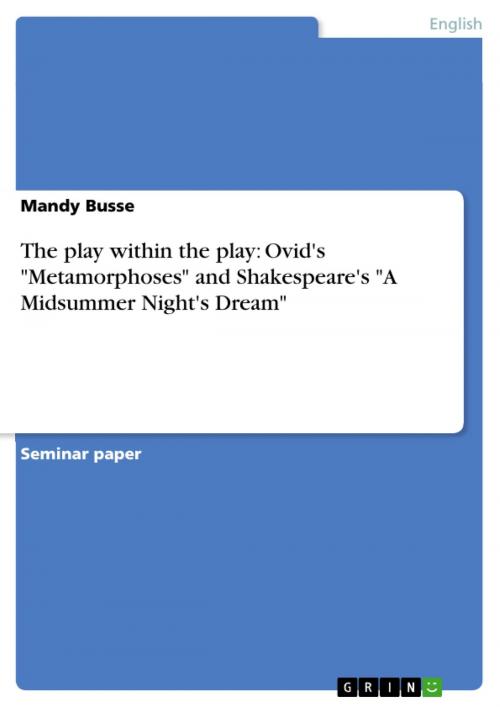The play within the play: Ovid's 'Metamorphoses' and Shakespeare's 'A Midsummer Night's Dream'
Fiction & Literature, Literary Theory & Criticism, British| Author: | Mandy Busse | ISBN: | 9783638770583 |
| Publisher: | GRIN Verlag | Publication: | June 16, 2007 |
| Imprint: | GRIN Verlag | Language: | English |
| Author: | Mandy Busse |
| ISBN: | 9783638770583 |
| Publisher: | GRIN Verlag |
| Publication: | June 16, 2007 |
| Imprint: | GRIN Verlag |
| Language: | English |
Seminar paper from the year 2006 in the subject English Language and Literature Studies - Literature, grade: 2,0, University of Erfurt, 10 entries in the bibliography, language: English, abstract: '[By Reading Ovid's Metamorphoses, the Elizabethans could](...) dig beneath its layers of fiction in an effort to recover the most precious secrets of the ancient world, whether moral, philosophical, historical, or scientific.' It is beyond all doubt, that the great poetry of Ovid (43 BC - 17 AD) had a strong influence on William Shakespeare's work. Understandably enough, as Ovid's work is a classical masterpiece of Latin literature. It fascinates with its formal perfection, urban humour and Ovid's creative fantasy. His outstanding opus is of course the Metamorphoses, the magnificent epic poem containing about 250 transformation legends of Greek and Roman mythology. Ovid's interests in myths show also the heroides, which include fictitious love letters. Love - this is undoubtedly a central theme in Ovid's literature. His writings Amores, Ars amatoria and Remedia amoris display that. Although Ovid's literature was banished from public libraries by emperor Augustus after the poet's death, his posthumous fame could not be prevented - fortunately. Ovid's work had a great influence on medieval literature and during renaissance his mythological stories had been example for many novellas . The role of Ovid's greatest opus, the Metamorphoses in Shakespeare's work, especially in his comedy A Midsummer Night's Dream, is going to be discussed in this paper. At first the focus lies on Ovidian literature in Elizabethan times. Then, the parody of Pyramus and Thisbe in A Midsummer Night's Dream will be analysed. A special kind of metamorphosis - the one of Bottom brings up the third main emphasis. By the way - what is a metamorphosis? It is said to be a process in which somebody or something changes completely into something different - for example a caterpillar that becomes a beautiful butterfly...
Seminar paper from the year 2006 in the subject English Language and Literature Studies - Literature, grade: 2,0, University of Erfurt, 10 entries in the bibliography, language: English, abstract: '[By Reading Ovid's Metamorphoses, the Elizabethans could](...) dig beneath its layers of fiction in an effort to recover the most precious secrets of the ancient world, whether moral, philosophical, historical, or scientific.' It is beyond all doubt, that the great poetry of Ovid (43 BC - 17 AD) had a strong influence on William Shakespeare's work. Understandably enough, as Ovid's work is a classical masterpiece of Latin literature. It fascinates with its formal perfection, urban humour and Ovid's creative fantasy. His outstanding opus is of course the Metamorphoses, the magnificent epic poem containing about 250 transformation legends of Greek and Roman mythology. Ovid's interests in myths show also the heroides, which include fictitious love letters. Love - this is undoubtedly a central theme in Ovid's literature. His writings Amores, Ars amatoria and Remedia amoris display that. Although Ovid's literature was banished from public libraries by emperor Augustus after the poet's death, his posthumous fame could not be prevented - fortunately. Ovid's work had a great influence on medieval literature and during renaissance his mythological stories had been example for many novellas . The role of Ovid's greatest opus, the Metamorphoses in Shakespeare's work, especially in his comedy A Midsummer Night's Dream, is going to be discussed in this paper. At first the focus lies on Ovidian literature in Elizabethan times. Then, the parody of Pyramus and Thisbe in A Midsummer Night's Dream will be analysed. A special kind of metamorphosis - the one of Bottom brings up the third main emphasis. By the way - what is a metamorphosis? It is said to be a process in which somebody or something changes completely into something different - for example a caterpillar that becomes a beautiful butterfly...















